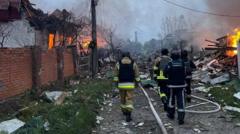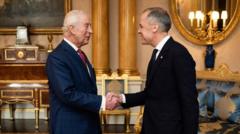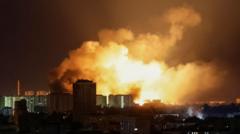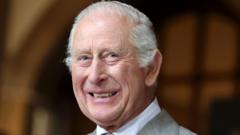As international pressure mounts, Russia appears resolute in its territorial claims, leaving the future of Ukrainian sovereignty increasingly uncertain.
**Unraveling the Complexities of Ukraine Peace Talks Amidst Growing Russian Confidence**
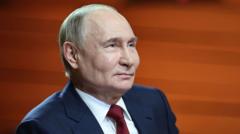
**Unraveling the Complexities of Ukraine Peace Talks Amidst Growing Russian Confidence**
The ongoing dialogue between Russia and Ukraine is faced with significant challenges as peace seems distant despite recent diplomatic efforts.
In the late hours of a recent evening at the Kremlin, I navigated through the sprawling grounds, only to be thwarted by guards at various checkpoints. This odd experience began with a supposed event involving President Vladimir Putin, one that was shrouded in mystery until I was ultimately met with an unexpected live statement instead of the anticipated press conference.
Putin announced an offer for direct talks with Ukraine in Istanbul, leading to a whirlwind two weeks of diplomacy that included tense phone conversations and peace discussions. However, questions remain about whether these efforts have made any substantive progress towards resolving the ongoing war. Right now, the fighting persists, and Russia adamantly dismisses any suggestion of signing a comprehensive ceasefire or returning seized territories.
Recent developments in the peace process reveal how Russia effectively navigates pressure from the West, particularly during a time when European leaders issued ultimatums to Putin after a key call with U.S. President Donald Trump. Rather than yielding to demands, Russia proposed talks in Turkey, which, despite skepticism, quieted immediate pressures for stricter sanctions.
In response to the various proposals and discussions, Russia has maintained a hardline stance, particularly regarding President Volodymyr Zelensky's legitimacy amidst ongoing martial law in Ukraine. When I confronted Foreign Minister Sergei Lavrov about the prospects of signing a peace deal, he evaded a direct commitment and suggested new elections might be necessary for negotiations to proceed.
Meanwhile, Russian media boasts confidence over recent diplomatic maneuvers, claiming significant advantages stemming from Trump’s approach. Reports highlight how Trump’s willingness to engage with Moscow without stringent conditions has emboldened the Kremlin to maintain its aggressive posture in Ukraine.
Despite expectations that Trump's presidency would quickly resolve the conflict, the war continues to rage on. Occasionally, Trump has rebuked Russia, criticizing the ongoing missile attacks on civilian areas. Still, he has shown a preference for easing tensions and mending U.S.-Russia relations over enforcing new sanctions.
While the Kremlin currently sidesteps significant international pressure and asserts its control on the battlefield, uncertainty looms over the future of peace in Ukraine. The struggle for sovereignty and the implications of increased Russian confidence remain at the forefront of this tangled diplomatic web. As further discussions between Putin and Trump progress, dilemmas regarding Ukraine's territorial integrity continue to cast a long shadow over peace prospects.
Putin announced an offer for direct talks with Ukraine in Istanbul, leading to a whirlwind two weeks of diplomacy that included tense phone conversations and peace discussions. However, questions remain about whether these efforts have made any substantive progress towards resolving the ongoing war. Right now, the fighting persists, and Russia adamantly dismisses any suggestion of signing a comprehensive ceasefire or returning seized territories.
Recent developments in the peace process reveal how Russia effectively navigates pressure from the West, particularly during a time when European leaders issued ultimatums to Putin after a key call with U.S. President Donald Trump. Rather than yielding to demands, Russia proposed talks in Turkey, which, despite skepticism, quieted immediate pressures for stricter sanctions.
In response to the various proposals and discussions, Russia has maintained a hardline stance, particularly regarding President Volodymyr Zelensky's legitimacy amidst ongoing martial law in Ukraine. When I confronted Foreign Minister Sergei Lavrov about the prospects of signing a peace deal, he evaded a direct commitment and suggested new elections might be necessary for negotiations to proceed.
Meanwhile, Russian media boasts confidence over recent diplomatic maneuvers, claiming significant advantages stemming from Trump’s approach. Reports highlight how Trump’s willingness to engage with Moscow without stringent conditions has emboldened the Kremlin to maintain its aggressive posture in Ukraine.
Despite expectations that Trump's presidency would quickly resolve the conflict, the war continues to rage on. Occasionally, Trump has rebuked Russia, criticizing the ongoing missile attacks on civilian areas. Still, he has shown a preference for easing tensions and mending U.S.-Russia relations over enforcing new sanctions.
While the Kremlin currently sidesteps significant international pressure and asserts its control on the battlefield, uncertainty looms over the future of peace in Ukraine. The struggle for sovereignty and the implications of increased Russian confidence remain at the forefront of this tangled diplomatic web. As further discussions between Putin and Trump progress, dilemmas regarding Ukraine's territorial integrity continue to cast a long shadow over peace prospects.

